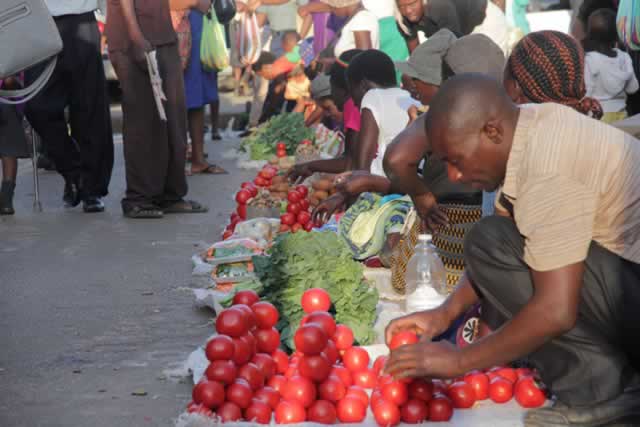Is outlawing street vending the way to go?

Lovemore Ranga Mataire Senior Writer
While street vendors in Harare have been vilified by local authorities, several studies have however, shown that vending has become an integral part of the world’s urban economies, contributing to vibrant markets and providing an assortment of affordable, accessible goods and services to urban consumers.
If numerous researches have proved that street vending is beneficial to the economic, social and cultural being of cities, why do most African cities continue advocating that the trade be outlawed? Why do local authorities continue to have a cat and mouse relationship with vendors?
The answer is simple. City fathers believe that street vendors bring menace to urban navigation as they tend to congest busy spots and in the process thwart smooth flow of traffic.
In light of occasional outbreaks of hygiene related diseases, city fathers also believe that street vending fuels such outbreaks because of uncollected waste and absence of proper ablution facilities.
Besides being the alleged sources of potential disease outbreaks, vending has also been cited as the breeding ground for criminal activities, something that makes a city unattractive to visitors and potential investors.
Off-street business operators also accuse vendors of bringing unfair competition as in most cases they operate adjacent or close to their entities. Vendors are often accused of competing unfairly against established business because they do not incur registration and taxation costs, do not have rentals and utility bills.
Fundamentally, street vending is generally despised by local authorities that feel they lose a lot of revenue through unaccounted monies that exchange hands everyday without anything coming to them besides being the provider of essential services that are also utilized by the vendors.
Despite this bleak characterisation, a recent survey by the African Development Bank said 55 percent of Africa’s GDP comes from the informal sector and employs about 80 percent of the labour force.
The irony is that Zimbabwe fully acknowledges the integral part played by the informal sector as exemplified by the setting up of the Ministry of Small to Medium Enterprises and Cooperative Development. It is reasoned that such a ministry is essential in formally harnessing massive the business transactions that daily take place within the sector.
Surprisingly, Harare City Council and Zimbabwe’s Ministry of Small to Medium Enterprises and Cooperative Development seem to be cutting the same cloth from different ends. One wants to completely drive vendors out of the CBD, while the other wants to accommodate them but is somewhat restrained from directly doing so on “legitimate” grounds of health often raised by the former particularly during this rain season.
A proper analysis of the pros and cons of vending in urban centres needs to be undertaken. Such an analysis would be able to inform both local authorities who are bent on roughing up vendors and some off-street businesses that are of the view that vending brings unfair competition that street vending, if properly regulated, contributes significantly to the total well-being of a country.
While it is acknowledged that street vending raises tension between the individual right to work and the collective right to public space, the overriding argument is that street vendors have their universal rights enshrined in the Universal Declaration of Human Rights and other normative frameworks at the international and national level.
Many constitutions in Africa, including Zimbabwe’s, guarantee the right to work and the right to undertake a trade or business and this is why some vending organisations have successfully argued in courts that their rights to a livelihood are being violated.
Another compelling argument often made by vending proponents is that outlawing vending violates principles of free and open competition in addition to individual rights to work and non-discrimination.
The argument often advanced by local authorities that street vendors complicate proper urban planning and efforts to elevate cities to “world-class” environments is a fallacious, especially when juxtaposed with the benefits of properly regulating vending.
If various researches have proven that vending is an integral and permanent feature in most cities and that in Africa it contributes 55 percent of the GDP, then it follows that it is poor management that generates all the malaise of congestion, criminality and pollution often attributed to street vending.
Street vendors provide essential services that most consumers can’t find in formal businesses. Vendors normally sell small items at affordable prices and in turn cater for the poor consumer who may not have enough money to buy in formal shops. Besides providing an alternative source of affordable goods, street vending presents a certain vitality to a city to visitors particularly food vending.
It is also important to note that street vending saves cities money by enabling the working poor to generate jobs for themselves instead of being dependent on city services or turn to criminal activities. Research has also shown that properly regulated vendors are not the source of diseases as they always make sure that their places of work are clean so as to attract customers and also not the reservoir for criminal activities.
Instead, vendors sometimes provide unorthodox watch over unusual activities in the city. A case in point is that of a New York vendor, Duane Jackson, who on May 1, 2010 alerted police to a car bomb in Times Square and was instrumental in assisting police to diffuse the bomb-laden SUV terror suspect Faisal Shahzad.
What are lacking in most cities in Africa are inclusive urban planning approaches that take into accounting vending activities. Even in the cases of food vending, local authorities need to award licenses to vendors whom they would offer training in food handling to reduce health risks. The officials would still need to undertake periodic checks to ascertain adherence to prescribed health tips.
It is interesting to note that in some other cities in the West and in Asia, there has been a surge in food vending sparked by intense interest among consumers and they have discussions regarding the proper role of city authorities in regulating the vending.
The street food movement has over the years emerged in part out of the economic recession that has made it difficult for upcoming businesspeople to have the required capital for a proper walled restaurant. The food movement has even incorporated higher-end gourmet food trucks as well as street food spin-offs from large restaurants.
The fervent support for the food movement in several cities worldwide points both to a need for readily available meal options for workers and a particular fervour for urban street food culture.
The positive attributes of regulated vending far outweigh the knee-jerk reaction of outlawing them. Street vendors are an integral part of world urban economies and contribute to the construction of a vibrant retail market through provision of a variety of affordable, accessible goods and services to urban consumers.
At a time when Zimbabwe’s economy is facing challenges, regulated street vending also provides a livelihood for those who have few employment opportunities, including migrants and internally displaced people. Many in Zimbabwe will recall a time when vending at Mbare was dominated by people from one southern African country.
African cities need to work on proper regulatory regimes of where, when and how vendors work. Inconsistent regulatory framework creates breeding ground for bribes and sometimes excessive penalties. It is archaic for urban planners to dismiss street vendors and their clients as irrelevant to urban planning. Constant running battles with vendors may be interpreted as harassment and create conduits for people with nefarious agendas to appropriate all vendors into a dubious association that turns a purely civic matter into a political grievance. — Zimpapers Syndication Services.









Comments